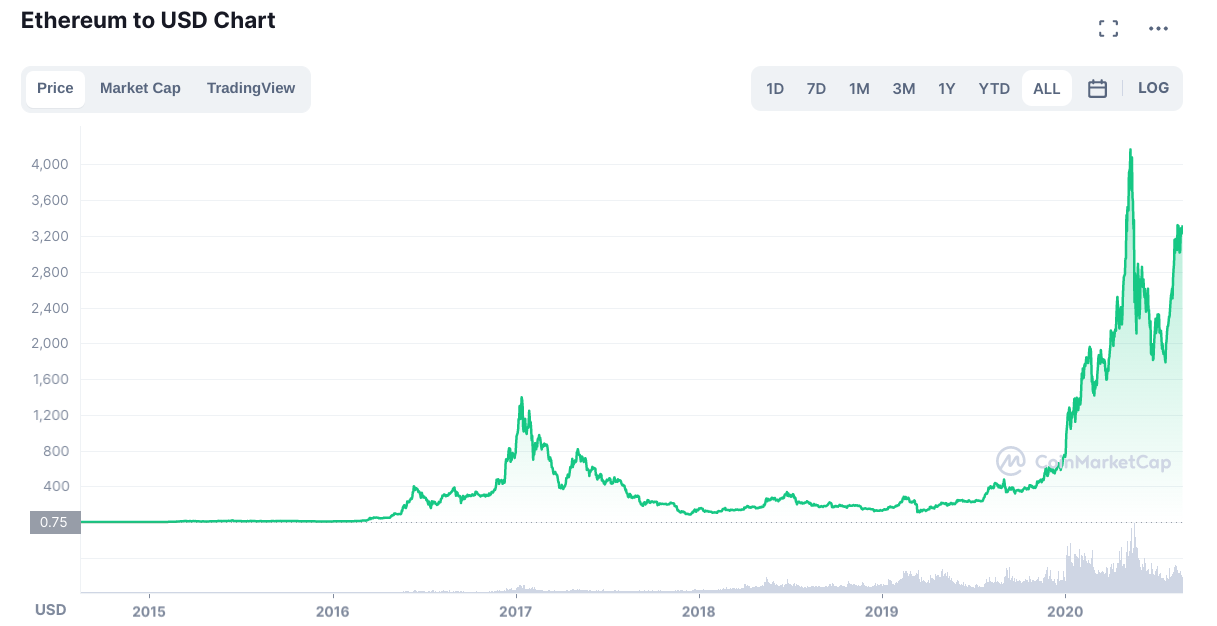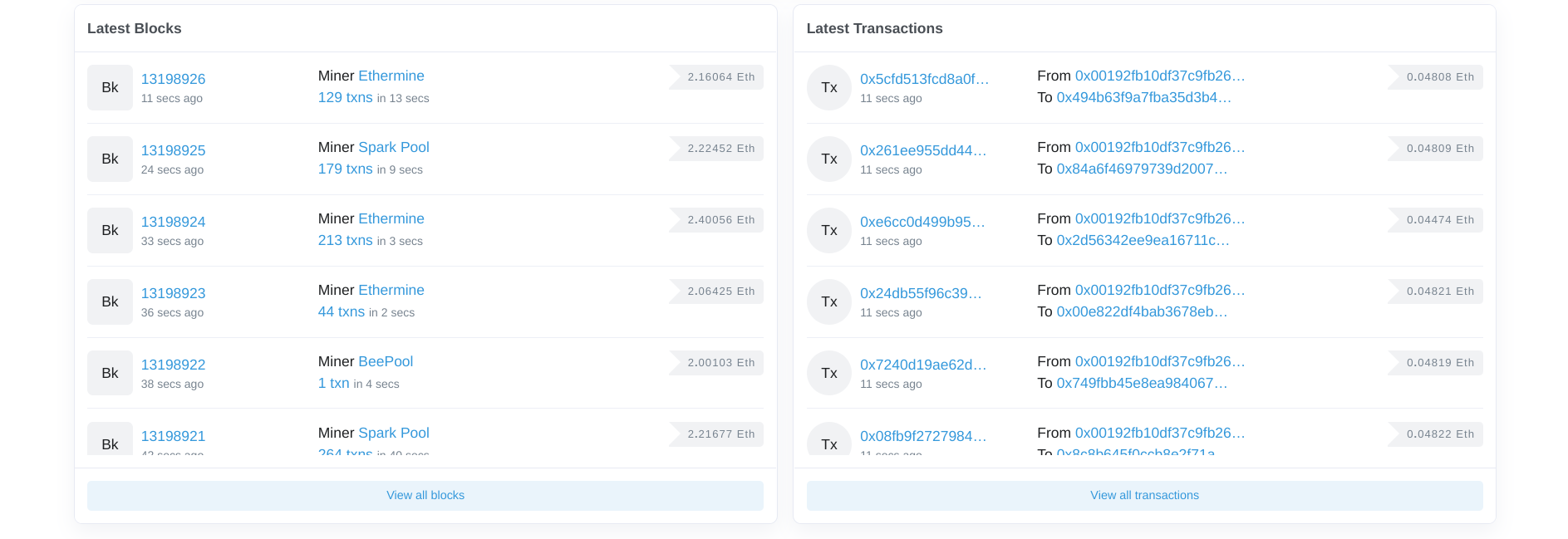Cryptocurrency is a form of digital money that’s been experiencing massive growth over the past few years. And out of the thousands of digital currencies that are available today, Ethereum is the second-most popular.
Like the most popular cryptocurrency, Bitcoin, Ethereum is an open cryptocurrency network where anyone with an internet connection can participate.
If you’re interested in getting started with Ethereum, keep reading to learn more about how it works. We'll also explain how you can buy, sell, exchange, use, and store Ethereum in your own cryptocurrency portfolio.
What Is Ethereum?
Ethereum is a cryptocurrency and a digital asset network. The Ethereum network is home to the Ether (ETH) coin, often referred to as Ethereum. But many other cryptocurrencies and distributed applications (dApps) are distributed via the Ethereum network as well.
You can buy and sell ETH through any major cryptocurrency exchange or brokerage. As with other cryptocurrencies, the price is highly volatile and can rise or fall suddenly with little warning. But its overall growth has been amazing, thanks in large part to its tremendous growth over the past two years.
In addition to the popular cryptocurrency, Ethereum is a blockchain platform that hosts other cryptocurrencies and digital assets. If you transact on the Ethereum network, you’re required to pay Ether as a fee to a network of miners. Miners are computers that track every Ethereum transaction.
Ethereum was created as a copy of the Bitcoin software, but with certain unique changes. This is known as a “hard fork.”
Anyone can create a free Ethereum wallet using their computer, smartphone, or account at a cryptocurrency exchange. And anyone with enough computer skills to buy or sell stocks online should have no problem navigating cryptocurrency.
How Does Ethereum Work?
The Ethereum cryptocurrency runs on the Etherem Blockchain. If that sentence sounded like Greek to you, don’t worry. We’ll decode the meaning and inner workings in this section.
Blockchain is a term for the type of database behind most cryptocurrencies. A blockchain is an open ledger that anyone can access. This open system allows for transparency, trust, and security.You can view any Ethereum transaction in history using a free Ethereum explorer, like Etherscan.io.
Every Ethereum transaction is broadcast from the owner’s wallet to the Ethereum network using the wallet address and private keys (more on this in the next section). When you enter a transaction using Ethereum, computers worldwide called miners race to verify the transaction and earn a transaction fee. This fee, called gas, is paid by Ethereum users when they transact.
Once a transaction is sent to the Ethereum blockchain, it can’t be reversed. The transaction becomes part of the next block of transactions recorded by the network. While this is a rigid network requirement, it allows for trust, security, and proper network functioning.
Every Ethereum coin is traceable from its origin to its current owner’s wallet. You can also lookup any wallet to see how much Ether it controls, as well as other assets like NFTs. These features make Ethereum exciting as both a currency and a network to host other currencies and dApps.
Ethereum Safety and Security
If you want to get started with Etherum, it’s important to understand how to do so safely. Unlike a credit card or a bank account, you likely won’t get any help or recoup losses if you make a mistake with your cryptocurrency accounts.
Every Ethereum wallet has a unique public address paired with a unique private key. The public address is used for sending and receiving. This is semi-anonymous. While you don’t want to publicize your wallet address, anyone could hypothetically find it on a blockchain explorer.
The private key unlocks your wallet to allow for sending. You should always keep your private keys 100% secret from others. Software wallets typically encrypt and store this information on your device, accessible only with a password. Hardware wallets take it a step further by taking your private keys offline. You need a physical device and unlock code to access Ethereum from this type of wallet.
If any digital "bad guys" are able to access your private keys, they can drain all assets from your wallet. And you likely won’t have any way to get them back.
Remember, blockchain transactions are one-way and can’t be reversed. If you use Ethereum, keep your accounts extremely secure. And keep good backups so you never lose access to your assets.
How To Buy And Store Ethereum
To buy and keep Etherem, you’ll need a standalone Ethereum wallet or an account with a cryptocurrency exchange or brokerage.
For most people, the easiest way to start is with an exchange like Coinbase that creates an Ethereum wallet for you. Buying Ethereum with most exchanges is similar to buying stock with a brokerage account.
For more security, you can use a distributed exchange like Exodus alongside a hardware wallet like Trezor. This type of strategy is our recommended option for long-term storage. Here’s a look at top options for buying and keeping Ethereum.
Best Ethereum Exchanges
An exchange is similar to a stock brokerage. You can buy and sell Ethereum and other cryptocurrencies with an account at any of these cryptocurrency exchanges:
- Coinbase: Coinbase is a large and well-known cryptocurrency brokerage. It’s very easy to use for beginners. To save on fees, consider the active trading platform Coinbase Pro. Read our Coinbase review.
- Gemini: Gemini is an exchange that puts a strong emphasis on earning interest from your cryptocurrency balances. However, beware of high trading fees.
- FTX US: FTX US is an arm of international crypto-exchange FTX just for users in the United States. It offers competitive fees, which go down for more active traders.
- Binance.US: Binance.US supports more than 50 cryptocurrencies and charges competitive trading fees. However, take note of extra fees when withdrawing to an external wallet.
- Exodus: Exodus is a software wallet and exchange in one. It’s better for intermediate to advanced users who want the privacy of a distributed exchange.
- Robinhood: Robinhood features free trading of stocks and cryptocurrencies. Note that you can’t withdraw Ethereum from Robinhood to an external wallet.
- Webull: Webull is another financial company that features both stock and cryptocurrencies. Crypto trading costs are fairly competitive. But, once again, you can’t withdraw to an external wallet.
Best Ethereum Wallets
An Ethereum wallet is a combination of a public address and a private key. While you could print these out and store them as a “paper wallet,” one of these software or hardware wallets is likely a better option for storing cryptocurrency long-term off an exchange.
- Trezor: For storing Ethereum, one of the best options is Trezor. This hardware wallet is easy to use and enhances your digital asset security.
- Exodus: As mentioned above, Exodus is a software wallet and exchange. In addition to storing your software wallets, you can plug in a hardware wallet to interact using Exodus.
- Keystone: Keystone Pro is one of the most secure hardware wallets I’ve come across. It's an offline hardware wallet that uses top-of-the-line security technology.
- Ledger: Ledger is a a good choice for those who want a budget hardware wallet option.
Is Ethereum Right For You?
Like all cryptocurrencies, Ethereum is volatile and risky. But it ranks as the second-biggest digital currency by market capitalization. If you’re looking to buy a cryptocurrency other than Bitcoin, Ethereum is typically the next place to look. The Ethereum network is also useful for buying other digital assets, including other cryptocurrencies and NFTs.
While you shouldn’t invest more than you can afford to lose, it’s always a great time to get started with Ethereum. Just wade into the waters cautiously and limit your risk based on your own financial situation and comfort. And once you see your first ETH in your account, buckle up for the inevitable ups and downs of cryptocurrency markets.

Eric Rosenberg is a financial writer, speaker, and consultant based in Ventura, California. He holds an undergraduate finance degree from the University of Colorado and an MBA in finance from the University of Denver. After working as a bank manager and then nearly a decade in corporate finance and accounting, Eric left the corporate world for full-time online self-employment. His work has been featured in online publications including Business Insider, Nerdwallet, Investopedia, The Balance, HuffPo, Investor Junkie, and other fine financial blogs and publications. When away from the computer, he enjoys spending time with his wife and three children, traveling the world, and tinkering with technology. Connect with him and learn more at EricRosenberg.com.



